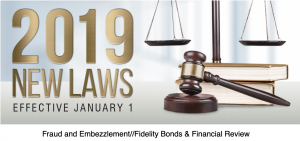 The COVID-19 pandemic has disrupted the community association industry both in terms of operations and morale. Community association members, board members, and community managers are presumably staying home to avoid contracting the coronavirus, and are not meeting in person. This seems to have led to a reluctance, by some association boards, to conduct business. Further, the social distancing requirements imposed by our State and local governments are eliminating social interaction that is critical to the functioning of the community. Along with this, the fear and uncertainty of the COVID-19 pandemic has altered the mood and attitude of board members and professionals involved with operating the community association.
The COVID-19 pandemic has disrupted the community association industry both in terms of operations and morale. Community association members, board members, and community managers are presumably staying home to avoid contracting the coronavirus, and are not meeting in person. This seems to have led to a reluctance, by some association boards, to conduct business. Further, the social distancing requirements imposed by our State and local governments are eliminating social interaction that is critical to the functioning of the community. Along with this, the fear and uncertainty of the COVID-19 pandemic has altered the mood and attitude of board members and professionals involved with operating the community association.
The disruption has become apparent and severe. However, we must examine the “silver linings” and “play with the cards we have been dealt” – so to speak – in order to preserve the integrity of our communities and functioning of same. The business that needed to be done before we all retreated to our homes to be safe still needs to get done and the longer boards wait to do that business, the more likely it is that there will be complications. Below are a few ideas that board members should consider moving forward in the face of this pandemic that may last for months.
1. Meetings. While in-person meetings should be avoided, associations may still be able to conduct meetings via conference call and/or videoconference (e.g., Zoom). The Davis-Stirling Act sets out a procedure for telephone conference meetings, but the Code requires that someone be at a physical location where the owners can listen to the call via speakerphone and participate during open forum. We believe that the ongoing pandemic would warrant a substantial compliance approach. That is, associations can conduct the meeting via telephone or video conference and attempt to comply with the applicable statutes, as much as possible, while at the same time complying with the State and City social distancing orders now in effect. This way, associations may still conduct business and hold meetings so that the common area components continue to be maintained, insurance policies do not lapse, and other obligations like enforcement of the Governing Documents are met. In other words, California community associations can still function while the board members and management are at the same time complying with government mandated social distancing requirements.
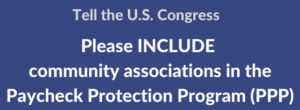 Prepared by the California Community Association Attorneys at SwedelsonGottlieb
Prepared by the California Community Association Attorneys at SwedelsonGottlieb 




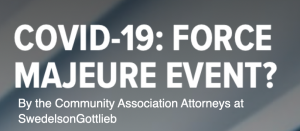 The spread of the coronavirus/COVID-19 has caused and will likely continue to cause unexpected interruption in the business of many California community associations. Many of our association clients are in the middle of large common area refurbishment and restoration projects. With increasing restrictions and/or recommendations by public officials and others intended to control the spread of the coronavirus, contractors/vendors may suspend or cease services/work and advance “force majeure” as a defense to the association’s breach of contract claim. It is important that board members and managers understand what force majeure means and how to respond when a contractor/vendor suspends or seeks to suspend their performance due to the coronavirus citing a force majeure clause contained in the contract between the association and the contractor or vendor.
The spread of the coronavirus/COVID-19 has caused and will likely continue to cause unexpected interruption in the business of many California community associations. Many of our association clients are in the middle of large common area refurbishment and restoration projects. With increasing restrictions and/or recommendations by public officials and others intended to control the spread of the coronavirus, contractors/vendors may suspend or cease services/work and advance “force majeure” as a defense to the association’s breach of contract claim. It is important that board members and managers understand what force majeure means and how to respond when a contractor/vendor suspends or seeks to suspend their performance due to the coronavirus citing a force majeure clause contained in the contract between the association and the contractor or vendor. 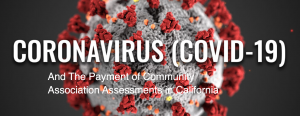 Recently, an attorney that also represents California community associations sent out a newsletter that dealt with assessment collection during the pandemic. We already addressed this issue in our
Recently, an attorney that also represents California community associations sent out a newsletter that dealt with assessment collection during the pandemic. We already addressed this issue in our  The COVID-19 pandemic has disrupted the community association industry both in terms of operations and morale. Community association members, board members, and community managers are presumably staying home to avoid contracting the coronavirus, and are not meeting in person. This seems to have led to a reluctance, by some association boards, to conduct business. Further, the social distancing requirements imposed by our State and local governments are eliminating social interaction that is critical to the functioning of the community. Along with this, the fear and uncertainty of the COVID-19 pandemic has altered the mood and attitude of board members and professionals involved with operating the community association.
The COVID-19 pandemic has disrupted the community association industry both in terms of operations and morale. Community association members, board members, and community managers are presumably staying home to avoid contracting the coronavirus, and are not meeting in person. This seems to have led to a reluctance, by some association boards, to conduct business. Further, the social distancing requirements imposed by our State and local governments are eliminating social interaction that is critical to the functioning of the community. Along with this, the fear and uncertainty of the COVID-19 pandemic has altered the mood and attitude of board members and professionals involved with operating the community association.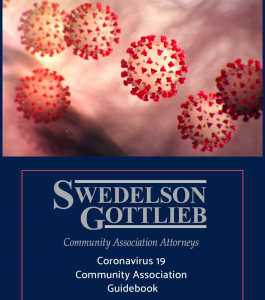 SwedelsonGottlieb updated its COVID-19 Community Association Guidebook on March 27, 2020. We put this Guidebook together to address our new reality and how California community associations should be dealing with the pandemic. We are all staying at home unless our jobs are essential and we are socially distancing ourselves from one another. The reality is that community associations cannot close down. Associations must continue to operate as they control the common areas where people live, and so much more. And the COVID-19 pandemic has created issues that we have never had to deal with in the past.
SwedelsonGottlieb updated its COVID-19 Community Association Guidebook on March 27, 2020. We put this Guidebook together to address our new reality and how California community associations should be dealing with the pandemic. We are all staying at home unless our jobs are essential and we are socially distancing ourselves from one another. The reality is that community associations cannot close down. Associations must continue to operate as they control the common areas where people live, and so much more. And the COVID-19 pandemic has created issues that we have never had to deal with in the past.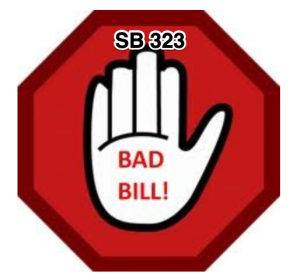
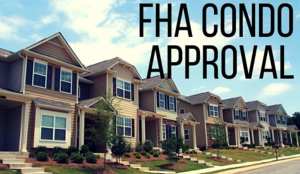 The U.S. Department of Housing and Urban Development (HUD) has finally published the long-awaited final revisions to the Federal Housing Administration’s (FHA) condominium project approval rules. The FHA does not originate loans for purchasing condos, but rather insures these loans for borrowers who might not otherwise qualify for traditional financing requiring a 20% down payment. In practice, these changes will give more people access to FHA-insured financing, which should in turn provide many Californians with a better chance of purchasing a condo. The new rules go into effect on October 14, 2019.
Some of the most significant changes in the FHA regulations include:
The U.S. Department of Housing and Urban Development (HUD) has finally published the long-awaited final revisions to the Federal Housing Administration’s (FHA) condominium project approval rules. The FHA does not originate loans for purchasing condos, but rather insures these loans for borrowers who might not otherwise qualify for traditional financing requiring a 20% down payment. In practice, these changes will give more people access to FHA-insured financing, which should in turn provide many Californians with a better chance of purchasing a condo. The new rules go into effect on October 14, 2019.
Some of the most significant changes in the FHA regulations include: